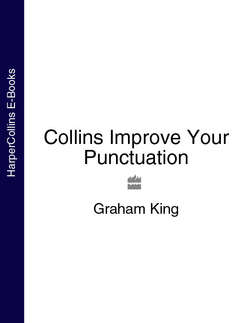Читать книгу Collins Improve Your Punctuation - Graham King - Страница 7
The Unique Nature of the Sentence
ОглавлениеSo, what is a sentence? The Oxford English Dictionary’s famous definition was: ‘Such portion of a composition or utterance as extends from one full stop to another.’ More recently (1998) the Collins English Dictionary described the sentence as ‘a sequence of words capable of standing alone to make an assertion, ask a question, or give a command, usually consisting of a subject and a predicate containing a finite verb.’ And there are dozens more stabs by eminent grammarians at defining what a sentence is and is not, which is surprising as the unit has been around for some 1,500 years.
What the grammarians seem to miss is the sentence’s quality of uniqueness. The American philologist Professor Stephen Pinker delights in pointing this out.
‘Go into the Library of Congress,’ he suggests, ‘and pick a sentence at random from any volume, and chances are you would fail to find an exact repetition no matter how long you continued to search. Estimates of the number of sentences that an ordinary person is capable of producing are breathtaking … Let’s assume that a person is capable of producing sentences up to twenty words long. Therefore the number of sentences that a speaker can deal with in principle is at least a hundred million trillion (100,000,000,000,000,000,000).’
If that statistic puts you into a spin, at least the functions of the sentence are quite straightforward:
• To make statements.
• To ask questions.
• To request action.
• To express feelings.
It’s also reasonable to say that a sentence should express a single idea, and that it should be complete in thought and construction. Like this:
The rare great crested newt was once called the great warty newt.
The sentence can be quite elastic, and punctuation allows us to expand this useful unit:
The rare great crested newt, which is native to Britain and rarely exceeds fifteen centimetres in length, was once called the great warty newt.
You’ll notice how the cunning commas have enabled us to double the length of the sentence without sacrificing any of its original clarity.
Sentences can also shrink, often alarmingly:
‘Don’t!’
That single word, providing it is given meaning by other words and thoughts surrounding it, is a sentence, or more accurately, a sentence fragment. Here it is, now in a context that provides its relevance and meaning:
I went over to the door and tried to open it.
‘Don’t!’
I spun around, searching for the owner of the angry voice.
In the darkness, a face appeared …
You can see that not only the surrounding words, but also a range of spaces and punctuation marks, help to give that single word the meaning intended. Here is another example, the opening of Charles Dickens’s novel Bleak House:
London. Michaelmas Term lately over, and the Lord Chancellor sitting in Lincoln’s Inn Hall. Implacable November weather. As much mud in the streets, as if the waters had but newly retired from the face of the earth, and it would not be wonderful to meet a Megalosaurus, forty feet long or so, waddling like an elephantine lizard up Holborn Hill. Smoke lowering down from chimney-pots, making a soft black drizzle, with flakes of soot in it as big as full-grown snow-flakes – gone into mourning, one might imagine, for the death of the sun. Dogs, undistinguishable in mire. Horses, scarcely better; splashed to their very blinkers.
Foot passengers, jostling one another’s umbrellas, in a general infection of ill-temper, and losing their foot-hold at street-corners, where tens of thousands of other foot passengers have been slipping and sliding since the day broke (if this day ever broke), adding new deposits to the crust upon crust of mud, sticking at those points tenaciously to the pavement, and accumulating at compound interest.
The first three sentences in this passage are not grammatical sentences at all, and most grammarians would choke over several of the others, too. But it is such a vivid evocation of a miserable rainy November day in Victorian London that few would dare to challenge the novelist’s masterly manipulation of the language. Or argue too much about ‘proper’ sentences. At least they are punctuated correctly; they all start with a capital letter and finish with a full stop.
